- Home
- Shelby Foote
The Civil War: A Narrative: Volume 2: Fredericksburg to Meridian Page 18
The Civil War: A Narrative: Volume 2: Fredericksburg to Meridian Read online
Page 18
Few would disagree with this assessment, even among the frock-coated politicians he had bested, whether senators or members of his cabinet. In point of fact, whatever shocks they had suffered along the way, there should have been little surprise at the outcome; for the matter had been essentially political, and politics (or statesmanship, if you will, which he once defined as the art of getting the best from men who all too often were intent on giving nothing better than their worst) was a science he had mastered some time back. The military art was something else. Whether Lincoln would ever do as well as Commander in Chief of the nation’s armies as he had done as its Chief Executive was more than doubtful—particularly in the light of current testimony as to the condition of the largest of those armies, still on the near bank of the Rappahannock attempting to recover from the shock of its mid-December blood bath.
“Exhaustion steals over the country. Confidence and hope are dying,” the Quartermaster General wrote privately this week to its commander. “The slumber of the army since [the attack at Fredericksburg] is eating into the vitals of the nation. As day after day has gone, my heart has sunk and I see greater peril to our nationality in the present condition of affairs than I have seen at any time during the struggle.” Complaints were heard from below as well as above, and though these were not addressed to Burnside personally, accusing fingers were leveled in his direction and even higher. “Our poppycorn generals kill men as Herod killed the innocents,” a Massachusetts private declared, and a Wisconsin major called this winter “the Valley Forge of the war.” A bitterness was spreading through the ranks. “Alas my poor country!” a New York corporal wrote home. “It has strong limbs to march and meet the foe, stout arms to strike heavy blows, brave hearts to dare. But the brains, the brains—have we no brains to use the arms and limbs and eager hearts with cunning? Perhaps Old Abe has some funny story to tell, appropriate to the occasion.… Mother, do not wonder that my loyalty is growing weak,” he added. “I am sick and tired of disaster and the fools that bring disaster upon us.”
There was a snatch of doggerel, sung to the tune of the old sea chanty “Johnny, Fill up the Bowl,” making the rounds:
Abram Lincoln, what yer ’bout?
Hurrah! Hurrah!
Stop this war. It’s all played out.
Hurrah! Hurrah!
Abram Lincoln, what yer ’bout?
Stop this war. It’s all played out.
We’ll all drink stone blind:
Johnny, fill up the bowl!
Veterans in the Army of the Potomac took up the refrain, “all played out,” and made it their own. Once they had pretended cynicism as a cover for their greenness and their fears, but now they felt they had earned it and they found the phrase descriptive of their outlook through this season of discontent. “The phrensy of our soldiers rushing to glory or death has, as our boys amusingly affirm, been played out,” a regimental chaplain wrote. “Our battle-worn veterans go into danger when ordered, remain as a stern duty so long as directed, and leave as soon as honor and duty allow.” Case-hardened by their recent experience over the river, particularly in the repeated fruitless assaults on the stone wall at the base of Marye’s Heights, they had no use for heroic postures or pretensions nowadays. When they saw magazine illustrations showing mounted officers with drawn sabers leading smartly aligned columns of troops unflinchingly through shellbursts, they snickered and jeered and whooped their motto: “All played out!”
Lincoln already knew something of this, but he learned a good deal more on December 29 when two disgruntled brigadiers hurried from Falmouth to Washington on short-term passes, intending to warn their congressmen of what they believed was imminent disaster. Burnside was planning to recross the Rappahannock any day now, having issued three days’ cooked rations the day after Christmas, along with orders for the troops to be held in readiness to move on twelve hours’ notice. What alarmed the two brigadiers—John Newton and John Cochrane, the latter a former Republican congressman himself—was that the army, which they were convinced was in a condition of near-mutiny, would come apart at the seams if it was called upon to repeat this soon the tragic performance it had staged two weeks ago in the same arena, and therefore they had come to warn the influential Bay State senator Henry Wilson, chairman of the Senate Military Committee, in hopes that he could get the movement stopped. In the intensity of their concern, as they discovered when they reached the capital, they had failed to take into account the fact that Congress was in recess over the holidays; Wilson had gone home. Undeterred, they went to see the Secretary of State, a former political associate of Cochrane’s. When Seward heard their burden of woes he took them straight to the President, to whom—though they were somewhat daunted now, never having intended to climb this high up the chain of command—they repeated, along with hasty assurances that the basis for their admittedly irregular visit was patriotism, not hope for advancement, their conviction that if the Army of the Potomac was committed to battle in its present discouraged state it would be utterly destroyed. Not only would it be unable to hold the line of the Rappahannock; it would not even be able to hold the line of the river from which it took its name. Lincoln, who had known nothing of the pending movement, and scarcely more of the extent of the demoralization Cochrane and Newton claimed was rampant, was infected with their fears and got off a wire to Burnside without delay: “I have good reason for saying that you must not make a general movement without first letting me know of it.”
Burnside, though his infantry had already been alerted for a downstream crossing while his cavalry was in motion for a feint upstream—“a risky expedition but a buster,” one trooper called the plan—promptly complied with the President’s telegram by canceling the movement, but he was angered and saddened by the obvious lack of confidence on the part of his superiors. The army, too—whatever its gladness over the postponement of another blood bath—was aggrieved as it filed back into its camps, feeling mistrusted and mistrustful. “Such checks destroy the enthusiasm of any army,” the same trooper dolefully protested.
Yet it was at this point, near the apparent nadir of its self-confidence and pride, with disaffection evident in all of its components, from the commander down to the youngest drummer boy, that the one truly imperishable quality of this army first began to be discerned, like a gleam that only shone in darkness. If men could survive the unprofitable slaughter of Fredericksburg—the patent bungling, the horror piled on pointless horror, and the disgust that came with the conclusion that their comrades had died less by way of proving their love for their country than by way of proving the ineptness of their leaders—it might well be that they could survive almost anything. There were those who saw this. There were those who, unlike Newton and Cochrane, did not mistake the vociferous reaction for near-mutiny, who knew that griping was not only the time-honored prerogative of the American soldier, from Valley Forge on down, but was also, in its way, a proof of his basic toughness and resilience. “The more I saw of the Army of the Potomac,” one correspondent wrote from the camps around Falmouth, “the more I wondered at its invincible spirit, which no disaster seemed able to destroy.” A Harper’s Weekly editor perhaps overstated the case—“All played out!” the soldiers who read it doubtless jeered—but was also thinking along these lines in an issue that came out about this time: “Like our forefathers the English, who always began their wars by getting soundly thrashed by their enemies, and only commenced to achieve success when it was thought they were exhausted, we are warming to the work with each mishap.”
Lincoln thought so, too, what time he managed to shake off the deep melancholy that was so much a part of his complex nature. He probed and, probing, he considered what emerged. As of the first day of the year which was opening so inauspiciously, the Union had 918,211 soldiers under arms, whereas the Confederacy had 446,622, or a good deal less than half as many. At several critical points along the thousand-mile line of division the odds were even longer—out in Middle Tennessee, for instan
ce, or down along the Rappahannock—and the troubled Commander in Chief found solace in brooding on the figures, even those that reached him from the field of Fredericksburg. “We lost fifty percent more men than did the enemy,” a member of the White House staff remarked after hearing his chief discuss the outcome of the fighting there, “and yet there is sense in the awful arithmetic propounded by Mr Lincoln. He says that if the same battle were to be fought over again, every day, through a week of days, with the same relative results, the army under Lee would be wiped out to the last man, [while] the Army of the Potomac would still be a mighty host. The war would be over, the Confederacy gone.” There was error here. Northern losses in the battle had exceeded southern losses, not by fifty, but by considerably better than one hundred percent. And yet there was validity in Lincoln’s premise as to the end result, and especially was there validity in the conclusion the staff man heard him draw: “No general yet found can face the arithmetic, but the end of the war will be at hand when he shall be discovered.”
Scott and McDowell, Pope and McClellan, and now Burnside: none of these was the killer he was seeking. Already he saw that this search was perhaps after all the major problem. All else—while, like Blondin, Lincoln threaded his way, burdened by untold treasures—was, in a sense, a biding of time until the unknown killer could be found. Somewhere he existed, and somewhere he would find him, this unidentified general who could face the grim arithmetic being scrawled in blood across these critical, tragic pages of the nation’s history.
These and other matters were much on the President’s mind when he woke on January 1. After an early-morning conference with Burnside, who had come up from Falmouth to ask in person just what the Commander in Chief’s “good reason” had been for not allowing him to handle his own army as he saw fit, Lincoln spent the usual half hour with his barber, then got into his best clothes and went downstairs for the accustomed New Year’s White House reception. For three hours, beginning at 11 o’clock, it was “How do you do?” “Thank you.” “Glad to see you.” “How do you do?” as the invited guests—high government officials, members of the diplomatic corps, and other important dignitaries, foreign and domestic—having threaded their way through the crowd of uninvited onlookers collected on the lawn, alighted from their carriages, came into the parlor, and filed past Lincoln for handshakes and refreshments. At 1 o’clock the long ordeal was over; he went back upstairs to his office for the day’s—or, some would say, the century’s—most important business, the signing of the Emancipation Proclamation.
Throughout the ninety-nine days since September 23, when the preliminary announcement of intention had been made, there had been much speculation as to whether he would issue or withdraw the final proclamation. Some were for it, some against. His friend Browning, for example, reflecting the view of constituents in the President’s home state, thought it “fraught with evil, and evil only.” The senator believed that the “useless and mischievous” document would serve “to unite and exasperate” the South, and to “divide and distract us in the North.” Lincoln himself, if only by his neglect of the subject while the hundred days ticked off, had seemed to see the point of this objection. In his December message to Congress he had barely mentioned the projected edict, but had reverted instead to his original plan for compensated emancipation, a quite different thing indeed. Alarmed by this apparent failure of nerve, Abolitionists looked to their hero Senator Charles Sumner of Massachusetts, who went to Lincoln three days after Christmas for a straight talk on the matter. He found him hard at work on the final draft of the proclamation, writing it out in longhand. “I know very well that the name connected with this document will never be forgotten,” Lincoln said, by way of explanation for his pains, and Sumner returned to his own desk to reassure a qualmish friend in Boston: “The President says he would not stop the Proclamation if he could, and he could not if he would.… Hallelujah!”
So it was. Seward brought the official copy over from the State Department, where a skilled penman had engrossed it from Lincoln’s final draft, just completed the night before. All it lacked was the President’s signature. He dipped his pen, then paused with it suspended over the expanse of whiteness spread out on his desk, and looked around with a serious expression. “I never in my life felt more certain that I was doing right,” he said, “than I do in signing this paper. But I have been receiving calls and shaking hands since 9 o’clock this morning, till my arm is stiff and numb. Now this signature is one that will be closely examined, and if they find my hand trembled they will say, ‘He had some compunctions.’ But anyway it is going to be done.” Slowly and carefully he signed, not the usual A. Lincoln, but his name in full: Abraham Lincoln. The witnesses crowded nearer for a look at the result, then laughed in relief of nervous tension; for the signature, though “slightly tremulous,” as Lincoln himself remarked, was bold and clear. Seward signed next, the quick, slanting scrawl of the busy administrator, and the great seal was affixed, after which it went to its place in the State Department files (where it later was destroyed by fire) and in the hearts of men, where it would remain forever, though some of them had doubted lately that it would even be issued.
It was one thing to claim that by the stroke of a pen the fetters had been struck from the limbs of five million slaves and that their combined worth of more than a billion dollars was thereby automatically subtracted from enemy assets. It was quite another, however, to translate the announcement into fact, especially considering its peculiar limitations. All of Delaware, Maryland, Kentucky, Tennessee, and Missouri were exempt by specific definition within the body of the edict, along with those portions of Virginia and Louisiana already under Federal control. Lincoln himself explained that the proclamation had “no constitutional or legal justification, except as a military measure. The exemptions were made because the military necessity did not apply to the exempted localities.” He freed no slave within his reach, and whether those beyond his reach would ever be affected by his pronouncement was dependent on the outcome of the war, which in turn depended on the southward progress of his armies. Just now that progress, East and West—once more with the possible exception of Middle Tennessee, where the issue remained in doubt—was negligible at best and nonexistent for the most part. Nor did the signs in either direction give promise of early improvement. Here in the East, in fact, if this morning’s conference with Burnside was any indication of what to expect, the outlook was downright bleak.
The ruff-whiskered general had arrived in a state of acute distress, obviously fretted by more than the discomforts of his all-night ride from Falmouth, and Lincoln was distressed in turn to see him so. He liked Burnside—almost everyone did, personally—for his courage, for his impressive military bearing, and for what one subordinate called his “single-hearted honesty and unselfishness.” All these qualities he had, and Lincoln, with a feeling of relief after weeks of trying to budge the balky McClellan, had chosen him in expectation of aggressiveness. The Indiana-born Rhode Islander had certainly given him that at Fredericksburg, in overplus indeed, but with a resolution so little tempered by discretion that critics now were remarking that he waged war in much the same way some folks played the fiddle, “by main strength and awkwardness.” He himself was the first to admit his shortcomings. He had done so from the start, and recently in testimony given under oath before a congressional committee he had taken on his shoulders the whole blame for the late repulse. This was in a way disarming; it had the welcome but unfamiliar sound of natural modesty, so becoming in a truly capable man. However, there were those who saw it merely as further proof of his unfitness for the job he had accepted under protest. Burnside, they said, had not only admitted his incompetency; he had sworn to it.
When he opened the New Year’s conference by asking what lay behind the telegram advising him not to move against the enemy without notifying Washington beforehand, Lincoln told him of the interview with the two brigadiers, in which they had stated that the army lacked confid
ence in its commander and was in no fit shape to be committed. Bristling at this evidence of perfidy from below, Burnside demanded to know their names, but Lincoln declined to divulge them for fear of the reprisal which he now saw would be visited upon their heads. This further increased the general’s depression. It might well be true, he said, that his army had no faith in him; certainly not a single one of his senior commanders had approved of the movement he had canceled at Lincoln’s suggestion. In fact, he added, plunging deeper into gloom, “It is my belief that I ought to retire to private life.” When Lincoln demurred, Burnside’s spirits rose a bit: enough, at least, to allow a sudden shift to the offensive. However low his own stock might have fallen, he said earnestly, he wanted the President to know that in his opinion neither Stanton’s nor Halleck’s was any higher. A man was apt to be a poor judge of his own usefulness and the loyalty of his subordinates, but of one thing he was sure. Neither the Secretary of War nor the general-in-chief had the confidence of the army—or of the country either for that matter, he quickly added, though he admitted that Lincoln was probably better informed on this latter point than he was. At any rate it was his belief that they too should be removed.… Lincoln expressed no opinion as to whether he could spare Stanton or Halleck, but he assured the unhappy Burnside that he valued his services highly. He urged him to return at once to his command and do the best he could, as he was sure he had done invariably in the past. Burnside replied that his plan was still to cross the Rappahannock, somewhere above or below Fredericksburg, and attack the rebels on their own ground. Lincoln said that was what he wanted, too, but prudence sometimes had to be applied, especially when risky ventures were involved. Whereupon, having secured this approval, however qualified, the general took his leave, apparently in a somewhat better frame of mind.

 Chickamauga and Other Civil War Stories
Chickamauga and Other Civil War Stories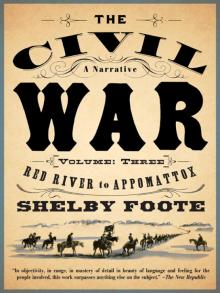 The Civil War: A Narrative: Volume 3: Red River to Appomattox
The Civil War: A Narrative: Volume 3: Red River to Appomattox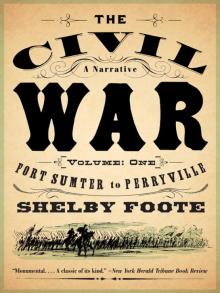 The Civil War: A Narrative: Volume 1: Fort Sumter to Perryville
The Civil War: A Narrative: Volume 1: Fort Sumter to Perryville Jordan County
Jordan County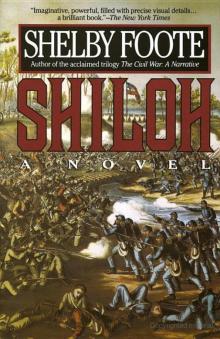 Shiloh
Shiloh Love in a Dry Season
Love in a Dry Season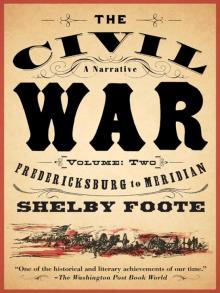 The Civil War: A Narrative: Volume 2: Fredericksburg to Meridian
The Civil War: A Narrative: Volume 2: Fredericksburg to Meridian Chickamauga
Chickamauga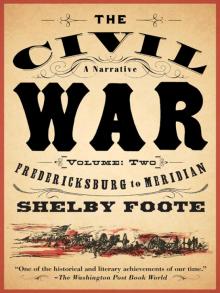 The Civil War: A Narrative: Fredericksburg to Meridian
The Civil War: A Narrative: Fredericksburg to Meridian